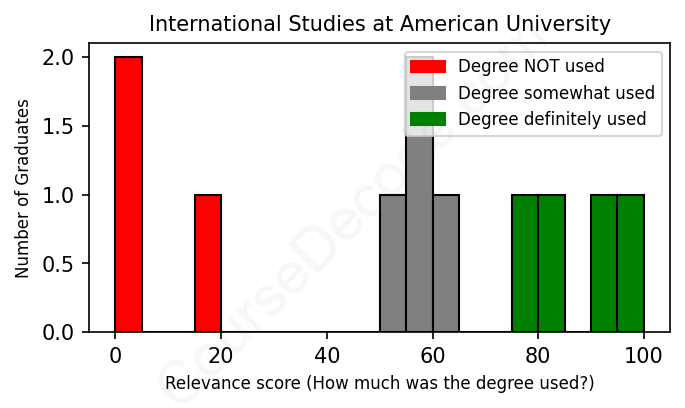
First, some facts. Of the International Studies graduates from American University we've analyzed , here's how many have used (or NOT used) their degree in their career:

These are estimates based on AI analysis of 11 LinkedIn profiles (see below).
The verdict? Significantly below average. Overall, with an average relevance score of 54%, International Studies graduates from American University have a much lower likelihood (-13%) of finding work in this field compared to the average graduate across all fields:
And for comparison, here's the chart for all profiles we've looked at across all degrees.
Also, after graduating, only 27% of these graduates have pursued further education other than another Bachelor's degree (such as a Masters degree or other), compared to the average across all profiles of 35%. This suggests a Bachelors degree is enough for most International Studies graduates, and it's normal to look for work straight after graduation.
See the details:
|
Relevance score: 55% We think this person has gone into a career only somewhat relevant to their degree. We think this person has gone into a career only somewhat relevant to their degree.
DEGREE INFOGraduated in 2012 from American University with a Bachelor of Arts (B.A.) in International Studies. Also pursued further education since (see below). JOB HISTORY SINCE GRADUATIONResearch Intern US DOD, National Defense University, Center for Transatlantic Security Studies Jan 2012 - Jul 2012 Business Development Consultant  Motive International, LLC Dec 2016 - Jan 2018 Executive Assistant to the Chief Technology Officer  National Association of Broadcasters Jan 2013 - Nov 2016 Director, Technology Operations  National Association of Broadcasters Nov 2016 - Feb 2018 Eco-Management Analyst, Presidential Management Fellow  U.S. Department of State Feb 2018 - Present FURTHER DEGREES DONE SINCE GRADUATINGMaster of Arts (M.A.)The George Washington University 2013 - 2016 ABOUTNo information provided. |
The top 10 most common jobs done by the graduates we've analyzed (ranked most common to least) are:
From analyzing the LinkedIn profiles of individuals who graduated with a degree in International Studies from American University, it’s clear that a mix of roles can be found across various fields. A lot of graduates seem to land in content creation and administrative positions, like writers, publicists, or assistants in different organizations. Often, these roles focus more on skills like writing or communication rather than the specific international relations knowledge one might expect from an International Studies degree. For instance, many writers or content directors produce material that may touch on global issues but don’t delve deeply into the core subjects of the degree. On the other hand, some graduates, especially those working in educational services or government positions, find themselves in roles that more directly intersect with international systems, educational frameworks, and policy development.
Overall, it appears that while some alumni have secured jobs that are relevant to their studies—particularly in areas related to international relations and policy—many have ended up in roles where their degree may not be directly applicable. This suggests that while an International Studies degree provides valuable skills and knowledge, it doesn’t always guarantee a direct pathway into roles that require that expertise. Graduates seem to diversify widely, moving into varied sectors where the connection to their degree isn’t always clear-cut, though some are certainly doing impactful work that aligns with their studies!
Here is a visual representation of the most common words in job titles for International Studies graduates (this is across all International Studies graduates we've analyzed, not just those who went to American University):

Looking at the career trajectories of graduates from American University with a degree in International Studies, it seems like they've had a pretty decent run in terms of finding relevant jobs post-grad, especially within the first few years. A lot of these individuals started off in roles like interns or assistants in government agencies or educational institutions, which aligns well with their academic background. For example, many landed positions related to education and learning, content creation, or even roles closely tied to public and international affairs. As they gained experience, it appears they moved up to more significant roles, with some working as managers or even founding their own companies. Others have excelled into high-level positions in government or international organizations like the U.S. Department of State.
Looking a bit further down the line, after five to ten years, a good number of these graduates appear to be in solid careers related to international affairs or policy-making, holding senior roles in organizations that impact global issues. There’s a noticeable trend where many have continued to grow within educational or governmental frameworks, while a few took paths in content and communications. Some graduates have ventured into more specialized fields like environmental policy or health, which reflects a diversity of interests stemming from their initial studies. Overall, it seems that a degree in International Studies from American University gives graduates a reliable launchpad towards meaningful and relevant careers rather than veering off into unrelated fields. So, if you're considering this major, it looks like there are some pretty good opportunities waiting for you after graduation!
Honestly, a Bachelor’s degree in International Studies can be a bit of a mixed bag. At American University, it’s not necessarily a walk in the park, but it’s also not the hardest thing you’ll ever do. You’ll definitely be challenged with readings, writing papers, and possibly learning a new language, depending on your focus. There’s a lot of discussion about global issues, and that can get pretty deep, but if you’re genuinely interested in the topics, it can be pretty engaging. It’s not like you're taking a bunch of super tough math courses or science labs, but you will need to stay on top of your assignments and keep up with the reading. Overall, if you have a passion for international affairs and are ready to put in the effort, you’ll probably find it to be a manageable and rewarding experience.
Most commonly, in the LinkedIn profiles we've looked at, it takes people 4 years to finish a Bachelor degree in International Studies.
Looking at these International Studies graduates from American University, it feels like they’ve had pretty varied career paths, and it’s hard to say definitively whether they’ve made “decent money.” Some have definitely climbed the ladder into higher-paying roles, like the graduate from 2015 who went from policy advisor to managing director, which usually bodes well in terms of salary. Others, though, seem to have been bouncing around between freelance gigs and lower-level positions, like teaching or administrative roles, which might not exactly be lottery-winning money. Overall, it seems like a mixed bag—some are likely doing well for themselves, while others might be still working their way up in the pay scale. So yeah, it's a bit of a mixed message on the financial front!
Here is a visual representation of the most common words seen in the "about" section of LinkedIn profiles who have a Bachelor degree in International Studies (this is across all International Studies graduates we've analyzed, not just those who went to American University). This may or may not be useful:

Here are all colleges offering a Bachelor degree in International Studies (ordered by the average relevance score of their International Studies graduates, best to worst) where we have analyzed at least 10 of their graduates:
| College | Score | Count |
|---|---|---|
 American University American University
|
54 | 11 |